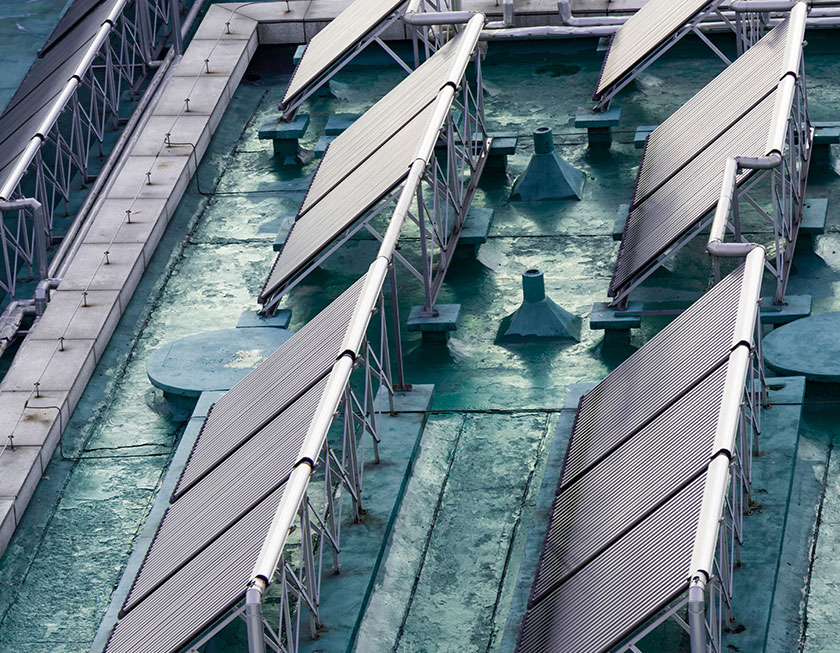3.1 Solar water heating systems: Why solar for water heating?

As we know it, water has a specific heat capacity of 4185 J K-1 kg-1. Simply, 1 kg of water requires as much as 4184 Joules of energy to increase its temperature just by 1 0C.
Let us compare the specific heat capacity of water with some other materials below to have a better understanding of water’s specific heat capacity [1].
Table 01: Specific heat capacity of several materials
| Material | Specific heat capacity (J K-1 kg-1) |
| Water | 4185 |
| Copper | 385 |
| Aluminium | 900 |
| Gold | 129 |
| Concrete | 880 |
| Potassium | 750 |
| Sand | 290 |
As we can see it, water is a silent heat store! It absorbs too much energy to show a small change in its temperature.
So…
Producing hot water means energy!
A huge amount of energy!
If we use gas or electricity to produce hot water (for showering, etc.) it would consume a great deal of fuel or electricity. That means a huge amount of money would leave your pocket and would release a huge amount of emissions into the atmosphere!
How much energy is really needed to produce hot water?
It depends on the amount of hot water produced and the temperature increment as well.
To illustrate, let us draw attention to a simple calculation related to a small family.
To begin with, it is important to know that the temperature of hot water used for showering is a personal preference. Some people may set the water heating system to deliver hot water at 450 C while some others prefer hot water at 400 C. Anyway, many people prefer hot water at 400 C. The amount of bath or length of time spent in the shower is another personal preference. A typical family of four members each having a daily showering of 10 minutes consumes approximately 400 liters of water a day.
The amount of energy needed to heat 1 L of water depends on the temperature difference between input water and water being delivered. The higher the difference the higher the amount of energy needed.
Now let’s calculate the amount of electricity consumed by a four-member family for hot water showering assuming that the temperature of water at the inlet is 250 C.
Average hot water consumption per family member per day= 100 L
Temperature of water at the inlet= 250 C
Temperature of water at the outlet= 400 C
Density of water= 1 kg/ L
Specific heat capacity of water (C) = 4185 J K-1 kg-1.
Mass of water (m) consumed = 100 L 1 kg L-1= 100 kg
Amount of energy needed to heat 100 L of water = mC∆θ
= 100 kg 4185 J K-1 kg-1 (400 C- 250 C)
= 6 278 000 J
= 6 278 kJ
What does it mean?
One family member consumes 6278 kJ of energy a day to produce hot water for showering.
Note that 1 kWh= 1000 J s-1 3600 s= 3600 kJ
Therefore, amount of electricity needed to produce the same amount of hot water (to heat from 250 C to 400 C)= (6278/3600) kWh= 1.74 kWh
A typical house of four members would consume approximately 7 kWh of electricity per day for showering. This would eventually add about 210 kWh to your monthly electricity bill!
This simple calculation clearly illustrates how electric or gas-powered hot water would cost you an arm and a leg!
So…
Why are you still receiving an unusually high energy bill?
Why are you still burning dead organisms to produce hot water?
Why are you still pumping hazardous emissions into the atmosphere to produce hot water?
Switching to solar hot water would be a wise decision. Instead of dead organisms (fossil fuels) or electricity, solar hot water systems use free energy coming from the Sun to produce hot water. Such a system can satisfy up to 100% of your hot water requirement with minimal amount greenhouse emission and can cut your energy bill by a reasonable amount. Further, they can provide hot water for about two decades for free but do not require frequent maintenance.
How do solar hot water systems work?
Let us discus their potential, technology, different configurations, and advantages, in next article.
Reference
